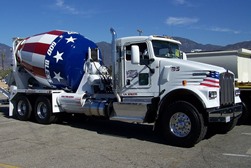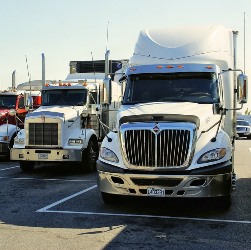How to Decide on the Best Trucker School near Denver Colorado
 Congrats on your decision to become a trucker and enroll in a CDL school near Denver CO. Maybe it has always been your dream to hit the open road while driving a huge tractor trailer. Or possibly you have done some research and have found that an occupation as a truck driver provides good pay and flexible job opportunities. Whatever your reason is, it's imperative to obtain the appropriate training by enrolling in the right CDL school in your area. When evaluating your options, there are certain factors that you'll want to examine before making your ultimate choice. Location will certainly be an issue, especially if you need to commute from your Denver home. The cost will also be of importance, but choosing a school based exclusively on price is not the optimal way to make sure you'll get the appropriate training. Just remember, your goal is to master the skills and knowledge that will allow you to pass the CDL exams and become a qualified truck driver. So keeping that goal in mind, just how do you decide on a truck driving school? That is what we are going to address in the remainder of this article. But first, we are going to review a little bit about which commercial driver's license you will ultimately need.
Congrats on your decision to become a trucker and enroll in a CDL school near Denver CO. Maybe it has always been your dream to hit the open road while driving a huge tractor trailer. Or possibly you have done some research and have found that an occupation as a truck driver provides good pay and flexible job opportunities. Whatever your reason is, it's imperative to obtain the appropriate training by enrolling in the right CDL school in your area. When evaluating your options, there are certain factors that you'll want to examine before making your ultimate choice. Location will certainly be an issue, especially if you need to commute from your Denver home. The cost will also be of importance, but choosing a school based exclusively on price is not the optimal way to make sure you'll get the appropriate training. Just remember, your goal is to master the skills and knowledge that will allow you to pass the CDL exams and become a qualified truck driver. So keeping that goal in mind, just how do you decide on a truck driving school? That is what we are going to address in the remainder of this article. But first, we are going to review a little bit about which commercial driver's license you will ultimately need.
Which Commercial Drivers License Is Required?

In order to operate commercial vehicles lawfully within the United States and Denver CO, an operator must attain a CDL (Commercial Driver's License). The 3 classes of licenses that a person can qualify for are Class A, Class B and Class C. Since the subject of this article is how to choose a truck driver school, we will focus on Class A and Class B licenses. What distinguishes each class of CDL is the kind of vehicle that the driver can operate together with the GVWR (Gross Vehicle Weight Rating) or GCWR (Gross Combination Weight Rating). Below are short summaries for the 2 classes.
Class A CDL. A Class A CDL is required to operate any vehicle that has a GCWR of more than 26,000 lbs., including a towed vehicle of greater than 10,000 lbs. A few of the vehicles that operators may be able to drive with Class A licenses are:
- Interstate or Intrastate Tractor Trailers
- Trucks with Double or Triple Trailers
- Tanker Trucks
- Livestock Carriers
- Class B and Class C Vehicles
Class B CDL. A Class B CDL is required to operate single vehicles having a GVWR of greater than 26,000 lbs., or a GCWR of greater than 26,000 lbs. including a towed vehicle weighing up to 10,000 lbs. A few of the vehicles that operators may be qualified to drive with Class B licenses are:
- Tractor Trailers
- Dump Trucks
- Cement Mixers
- Large Buses
- Class C Vehicles
Both Class A and Class B Commercial Drivers Licenses might also require endorsements to drive specific types of vehicles, including school or passenger buses. And a Class A license holder, with the appropriate required endorsements, can drive any vehicle that a Class B license holder is qualified to operate.
How to Assess a Truck Driver School

As soon as you have decided which CDL you would like to obtain, you can start the undertaking of researching the Denver CO truck driving schools that you are looking at. As already mentioned, location and cost will certainly be your initial concerns. But it can't be emphasized enough that they should not be your sole concerns. Other issues, for example the experience of the instructors or the reputations of the schools are equally or even more important. So below are some additional factors that you should research while performing your due diligence prior to selecting, and particularly paying for, your truck driver training.
Are the Schools Certified or Accredited ? Not many trucking schools in the Denver CO area are accredited due to the demanding process and expense to the schools. However, certification is more typical and is provided by the Professional Truck Driver Institute (PTDI). A school is not required to become certified, but there are a number of advantages. Prospective students recognize that the training will be of the highest quality, and that they will get an ample amount of driving time. As an example, PTDI requires 44 hours of real driving time, not ride-alongs or simulations. So if a school's course is certified (the course, not the school is certified), students know that the curriculum and training will fulfill the very high standards set by PTDI.
How Long in Operation? One clue to help measure the quality of a truck driving school is how long it has been in business. A poorly reviewed or a fly by night school typically will not be in business very long, so longevity is a plus. Having said that, even the top Denver CO schools had to start from their opening day of training, so use it as one of several qualifiers. You can also learn what the school's track record is pertaining to successful licensing and job placement of its graduates. If a school won't supply those numbers, look elsewhere. The schools should additionally maintain associations with regional and national trucking companies. Having a large number of contacts not only points to a quality reputation within the profession, but also bolsters their job placement program for students. It also wouldn't hurt to contact the Colorado licensing department to verify that the CDL trucker schools you are considering are in good standing.
How Effective is the Training? As a minimum requirement, the schools should be licensed in Colorado and employ instructors that are experienced and trained. We will cover more about the instructors in the following segment. In addition, the student to instructor proportion should not be higher than 4 to 1. If it's any higher, then students will not be obtaining the personal attention they will need. This is particularly true concerning the one-on-one instruction for behind the wheel training. And watch out for any school that professes it can teach you to be a truck driver in a relatively short time frame. Training to be an operator and to drive a tractor trailer skillfully takes time. The majority of Denver CO schools offer training courses that run from 3 weeks to as long as two months, depending on the class of license or type of vehicle.
How Experienced are the Instructors? As earlier mentioned, it's imperative that the teachers are trained to teach driving techniques and experienced as both drivers and instructors. Although several states have minimum driving time prerequisites to qualify as a teacher, the more successful driving experience an instructor has the better. It's also vital that the instructors stay current with industry developments or any new laws or changes in regulations. Assessing teachers may be a bit more intuitive than other standards, and possibly the ideal method is to pay a visit to the school and talk to the teachers face to face. You can also talk to a few of the students completing the training and find out if they are happy with the level of instruction and the teacher's qualification to train them.
Sufficient Driving Time? Above all else, a great truck driving school will provide ample driving time to its students. Besides, isn't that what it's all about? Driving time is the real time spent behind the wheel operating a truck. While the use of simulators and ride-a-longs with other students are essential training tools, they are no alternative for actual driving. The more instruction that a student gets behind the wheel, the better driver she or he will become. Although driving time differs among schools, a good standard is 32 hours at a minimum. If the school is PTDI certified, it will furnish a minimum of 44 hours of driving time. Contact the Denver CO schools you are considering and find out how much driving time they furnish.
Are they Independent or Captive ? It's possible to obtain discounted or even free training from a number of truck driving schools if you enter into an agreement to drive for a specific carrier for a defined time period. This is called contract training, and the schools that offer it are called captives. So instead of having associations with numerous trucking lines that they can refer their students to, captives only work with one company. The benefit is receiving less expensive or even free training by surrendering the freedom to initially be a driver wherever you choose. Naturally contract training has the potential to reduce your income opportunities when starting out. But for many it may be the best way to get affordable training. Just be sure to find out if the Denver CO schools you are looking at are independent or captive so that you can make an informed decision.
Is there CDL Testing Onsite? There are several states that will permit 3rd party CDL testing onsite of trucking schools for its students. If onsite testing is permitted in Colorado, ask if the schools you are looking at are DMV certified to provide it. One advantage is that it is more accommodating than contending with graduates from other schools for test times at Colorado testing locations. It is moreover an indication that the DMV believes the authorized schools to be of a superior quality.
Are the Classes Convenient? As formerly mentioned, truck driving training is just one to two months in length. With such a short term, it's imperative that the Denver CO school you select offers flexibility for both the curriculum and the scheduling of classes. For example, if you're having difficulty learning a particular driving maneuver, then the teacher should be prepared to dedicate more time with you until you have it mastered. And if you're still working while going to training, then the class scheduling must be flexible enough to fit in working hours or other responsibilities.
Is Job Assistance Provided? As soon as you have obtained your commercial driver's license after graduating from trucking school, you will be impatient to begin your new career. Make sure that the schools you are reviewing have job assistance programs. Ask what their job placement ratio is and what average salary their graduates start at. Also, find out which local and national trucking firms their graduates are referred to for employment. If a school has a low job placement rate or few Denver CO employers hiring their grads, it might be a clue to search elsewhere.
Is Financial Assistance Available? Trucking schools are similar to colleges and other Denver CO area vocational or trade schools when it comes to loans and other forms of financial aid being offered. Find out if the schools you are examining have a financial aid department, or at a minimum someone who can help you navigate the options and forms that must be completed.
Learn More About Denver CDL Driver Schools
Choose the Right Denver CO CDL Training
Choosing the appropriate truck driver school is an important first step to beginning your new vocation as a local or long distance truck driver. The skill sets that you will learn at school will be those that forge a new career behind the wheel. There are a number of options offered and understanding them is vital to a new driver's success. However, you must obtain the appropriate training in order to drive a large commercial vehicle in a professional and safe fashion. If you are lacking cash or financing, you might need to consider a captive school. You will pay a lower or in some cases no tuition in exchange for driving for their contracted carrier. Or you can select an independent trucking school and have the option of driving for the trucking company of your choice, or one of several affiliated with the school. It's your choice. But no matter how you get your training, you will in the near future be entering an industry that helps our country move as a professional trucker in Denver CO.
